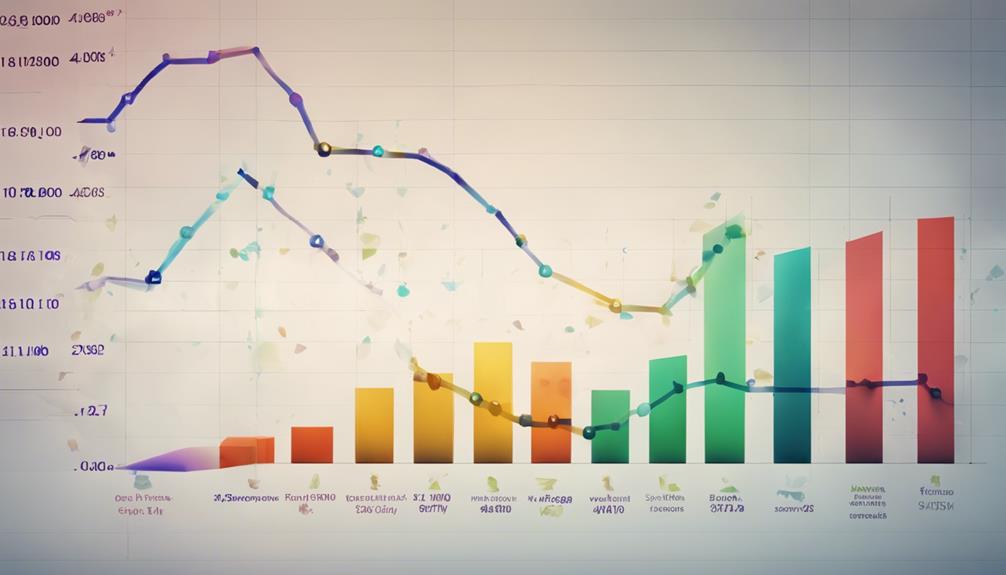Understanding the importance of the longevity of your retirement savings is crucial. Factors such as market changes, inflation, and healthcare costs can impact your savings. You can maximize your funds by working part-time, considering a reverse mortgage, or relocating to save on costs. It is key to monitor withdrawal strategies, adjust rates, and stay informed. Use calculators to estimate how long your savings will last and ensure financial security. Regularly review your plan, diversify your investments, seek expert advice, and manage risks for a secure retirement. Make securing your financial future after retirement a top priority. Explore valuable insights on maintaining financial stability during retirement in the detailed resources available.
Key Takeaways
- Estimate savings duration with a retirement calculator.
- Monitor and adjust withdrawal rates for longevity.
- Consider market fluctuations, inflation, and healthcare costs.
- Seek financial advice for personalized strategies.
- Diversify investments and plan for unexpected expenses.
Factors Impacting Retirement Savings Longevity

Factors impacting the longevity of retirement savings encompass various elements such as market fluctuations, inflation, rising healthcare costs, longevity risk, and tax implications.
Market fluctuations can have a substantial impact on the financial health of retirement savings. Sudden drops in the market can lead to a decrease in the value of investments, affecting the overall amount available for retirement.
Inflation is another key factor that retirees need to take into account. As prices rise over time, the purchasing power of retirement savings diminishes, potentially shortening the lifespan of funds.
Additionally, the increasing costs of healthcare pose a significant threat to retirement savings. Unexpected medical expenses can deplete savings quickly if not factored into retirement planning.
Longevity risk, the risk of outliving one's savings, underscores the importance of strategic financial planning to secure a stable and sustainable retirement income.
Understanding the tax implications of withdrawals and investments is essential for effectively managing retirement savings, as taxes can impact the overall growth and longevity of funds.
Strategies to Maximize Retirement Funds

To optimize and extend your retirement funds effectively, contemplate implementing strategic financial approaches and practical tactics. One way to supplement your income during retirement is by working part-time. This can help prolong your savings by providing an additional source of funds. Another option to ponder is utilizing a reverse mortgage if you are 62 or older. A reverse mortgage allows you to tap into your home equity for extra funds, which can be beneficial in certain situations. Additionally, exploring the possibility of relocating to a more affordable area can help reduce living expenses and stretch your retirement savings further. Seeking out investment opportunities with growth potential is also a wise strategy to increase your retirement funds over time. Finally, consulting with financial advisors to develop personalized strategies tailored to your specific financial situation can provide valuable guidance on how to optimize and extend your retirement savings.
| Strategies to Maximize Retirement Funds | ||
|---|---|---|
| Part-time work | Reverse mortgage | Relocate to save |
| Invest for growth | Consult advisors |
Importance of Monitoring Withdrawal Strategies

Consistently evaluating and adapting withdrawal strategies is essential for ensuring the longevity and effectiveness of your retirement savings. Monitoring withdrawal strategies can make a significant difference in how long your retirement savings last.
Here are three reasons why monitoring withdrawal strategies is vital:
- Optimizing Retirement Income: By regularly reviewing your withdrawal rates based on market performance and personal financial goals, you can maximize your retirement income. Adjusting these strategies can help you make the most of your savings, ensuring they last throughout your retirement.
- Adapting to Economic Conditions: Monitoring withdrawal strategies allows for flexibility in adjusting to changing economic conditions and unexpected expenses. This adaptability can help you navigate financial challenges and maintain stability in retirement.
- Informed Financial Decisions: Tracking withdrawal strategies empowers you to make informed financial decisions. By staying proactive and adjusting your plans as needed, you can mitigate risks and enhance the longevity of your retirement savings.
Longevity of Retirement Savings Calculator

Monitoring withdrawal strategies to optimize retirement income and adapt to economic conditions is essential for the longevity of your retirement savings. Now, exploring the Longevity of Retirement Savings Calculator will provide insight into estimating the duration of your savings based on key financial factors.
This calculator assists in forecasting how long your retirement savings will last by considering variables such as withdrawal rate, nest egg size, inflation, market performance, and annual withdrawals. By inputting accurate data into the calculator, you can gain a projection of your retirement funds' sustainability.
Understanding the results provided by the longevity calculator can guide your retirement strategy, allowing you to make informed decisions and necessary adjustments to secure long-term financial security. Planning for retirement involves evaluating how your savings will hold up over time, and utilizing tools like the longevity calculator can offer a clearer picture of your financial future, aiding in securing a stable retirement income.
Tips for Securing Financial Future in Retirement

Implementing a diversified investment strategy can help secure a stable financial future in retirement. To safeguard your financial well-being during retirement, consider the following tips:
- Regularly reassess your retirement savings plan: Confirm that it aligns with your financial goals and needs, adjusting as necessary to stay on track.
- Diversify your investments: Mitigate risk and potentially increase returns by spreading your investments across various asset classes such as stocks, bonds, and real estate.
- Consult a financial advisor: Optimize your retirement income strategy with professional guidance to address any gaps in your plan and make informed decisions.
Frequently Asked Questions
Can I Use Retirement Savings for Emergencies?
While retirement savings are ideally reserved for your golden years, tapping into them for emergencies can be an option of last resort. Doing so prematurely can jeopardize your financial security in retirement.
Consider creating a separate emergency fund to cover unexpected expenses and keep your retirement savings intact. Prioritize building this fund to avoid dipping into your retirement nest egg unless absolutely necessary, helping safeguard your future financial health.
What Happens to Retirement Savings After Death?
After passing away, retirement savings are usually transferred to beneficiaries or heirs as part of the estate. Depending on the account type and estate planning, beneficiaries may receive the funds directly or through a trust.
It's important to update beneficiaries regularly and consider tax implications. Seeking advice from a financial advisor or estate planner can help guarantee a smooth transfer of retirement savings to loved ones.
Are There Penalties for Early Retirement Fund Withdrawal?
Early withdrawal from retirement funds can result in penalties, such as a 10% tax on the withdrawn amount if done before the age of 59 1/2. Additionally, income taxes may apply on the withdrawn funds.
It is important to take into account these penalties before tapping into your retirement savings prematurely. Explore alternative options, like loans or hardship withdrawals if facing financial difficulties, to avoid unnecessary penalties and preserve your retirement nest egg.
How Do Market Fluctuations Affect Retirement Savings?
Market fluctuations can have a significant impact on retirement savings. These changes in the stock market can cause the value of investments to rise or fall, affecting the overall portfolio.
It's important for retirees to diversify their investments to mitigate the impact of market volatility. By spreading out investments across different asset classes, individuals can potentially reduce risk and increase the likelihood of maintaining a stable retirement income despite market fluctuations.
Is It Possible to Outlive Retirement Savings?
It is indeed possible to outlive retirement savings if proper planning and financial management are not in place. Factors like longevity, healthcare costs, inflation, and unexpected expenses can deplete savings faster than anticipated.
To safeguard against this risk, individuals should consider strategies such as diversifying investments, maximizing retirement account contributions, and seeking professional guidance to guarantee their savings can sustain them throughout their retirement years.
Conclusion
In summary, it is important to carefully consider factors that impact the longevity of retirement savings and to implement strategies to maximize funds. This includes evaluating investment options, managing withdrawal rates, and planning for unforeseen expenses to ensure financial stability throughout retirement. By staying informed and proactive, individuals can make well-informed decisions that align with their financial goals. Incorporating maximizing retirement savings strategies early on can significantly enhance the ability to maintain a comfortable lifestyle for the long term.
Monitoring withdrawal strategies and utilizing tools like the Longevity of Retirement Savings Calculator can help secure a stable financial future in retirement.
By taking proactive steps and staying informed, individuals can guarantee their savings will last a lifetime.
Remember, the key to financial security in retirement lies in diligent planning and prudent decision-making.









